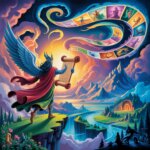
Exploring the Vast World of Mythological Tales
Introduction to Mythological Tales
Mythological tales, spanning from the misty heights of Mount Olympus to the mysterious realms of Norse Valhalla, have captivated the human imagination for centuries. These stories, rich with gods, heroes, and monstrous creatures, serve not only as entertainment but also as profound components of cultural identity and moral instruction. Rooted deeply in the ancient soils of civilizations around the world, myths offer a window into the beliefs, values, and struggles of our ancestors.
The Role of Mythology in Ancient Societies
Mythology functioned as the backbone of early societal norms and helped ancient people explain the natural and spiritual worlds. In every culture, these myths pervaded daily life, offering explanations for natural phenomena, human behavior, and existential queries. The gods and goddesses, heroes, and mythical creatures were not just subjects of worship and admiration but were integral to teaching morality, bravery, and the virtues of life.
Myths as Cultural Narratives
In Greece, tales of Zeus and Hera, Apollo and Artemis, served not only to entertain but to enforce the social orders and religious practices. In Norse mythology, stories of Odin and Thor were not mere escapades but also mirrored values such as bravery, perseverance, and honor that were vital to Viking society.
Educational Purposes of Myths
Myths were often used as educational tools, passed down through generations to help children understand their world and their place within it. Through these stories, young ones learned about their history, the importance of customs, the consequences of good versus evil, and the virtues necessary for survival in often harsh landscapes.
Types of Mythological Tales
Mythological tales can be broadly categorized into several types, each serving a unique purpose and illustrating different aspects of life and the universe.
Cosmogonic Myths
Cosmogonic myths explain the origin of the world or the universe. Examples include the Norse tale of Ymir, whose body created the earth, or the Greek story of Chaos, from whom all life sprang.
Eschatological Myths
These myths reveal the end of times or the destiny of the universe. Norse mythology’s Ragnarok, the prophesied apocalypse involving major gods like Thor and Loki, is a prime example of this type.
Foundational Myths
These stories outline the origins and significance of a city, nation, or culture. Rome’s tale of Romulus and Remus is an essential foundational myth that explains the city’s divine origins and its core cultural values.
Impact of Mythology in Modern Times
While the literal belief in mythological figures has waned, the impact of these stories continues to be significant. Modern literature, cinema, and various art forms frequently draw on mythological themes. Stories of heroic journeys and epic battles resonate in today’s narratives, shaping our heroes and antiheroes.
Influence on Literature and Film
Great works of literature from Dante’s “Divine Comedy” to the more recent “Lord of the Rings” by J.R.R. Tolkien, and films such as “Star Wars,” show the lasting influence of mythological structures and archetypes.
Psychological and Philosophical Significance
Carl Jung’s analysis of universal archetypes and Joseph Campbell’s exploration of the hero’s journey reveal the deep psychological roots and the continuous relevance of myths in understanding human behavior and societal structures.
Conclusion
In conclusion, mythological tales are not merely relics of the past but are lively, evolving narratives that continue to provide insight into human nature and cultural ideals. As long as humanity seeks to understand itself and the cosmos, these ancient stories will remain an essential part of our collective intellectual heritage, adapting and enduring in various forms through generations.
